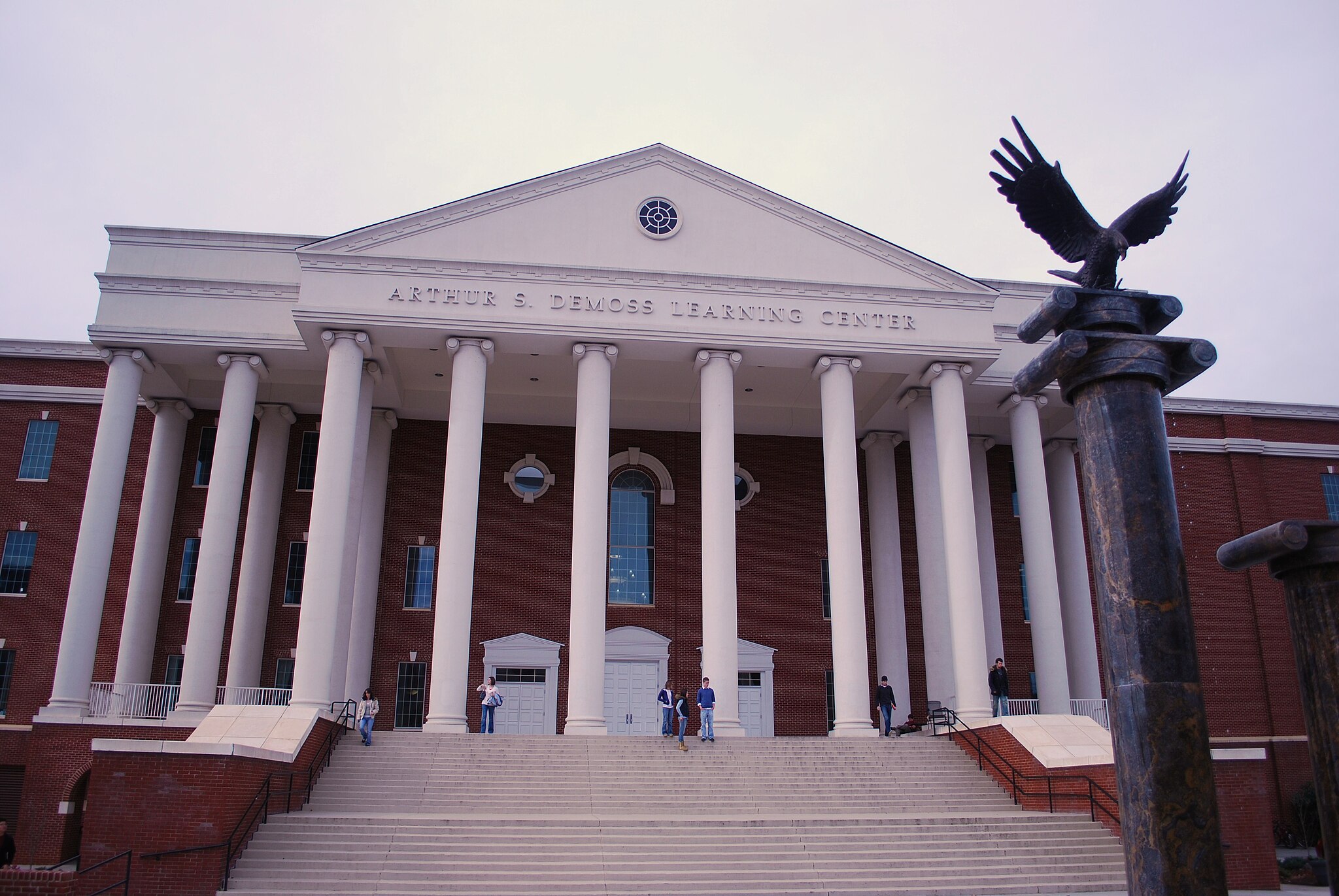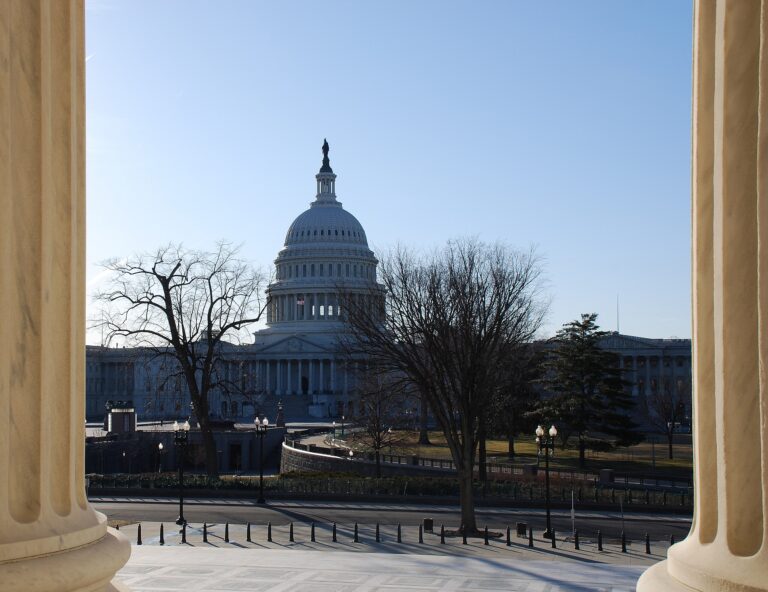
Religious Exemptions and Retaliation under Title IX
Constance Couch
Photo on Wikimedia by EOverbey (CC BY-SA 3.0).
In 2013, Jane Doe 6 was a residential student at Liberty University, the country’s largest Baptist Christian university. One night, her boyfriend invited her to his house, gave her two glasses of wine, and she immediately became immobile from a date rape drug he put in her second drink. She remembered him climbing on top of her–despite her struggling to defend herself–and then passing out. Hours later, Jane Doe 6 woke up in his car and begged to be taken to the hospital. Instead, he dropped her off at her dorm.
When Jane Doe 6 approached Liberty University for help, the university advised her that she would be offered counseling, which she believed was an opportunity to discuss the rape. However, the university never provided counseling and instead, fined her $500 for drinking alcohol that night, which was a violation of the school’s strict honor code. The university also notified Jane Doe 6 that her transcript would not be released unless she paid the $500. She was not aware of Title IX, nor was she aware of the procedures it provides to handle the trauma she experienced. Instead, Jane Doe 6 believed that the university’s response to the rape was the fine it imposed on her. After completing the academic quarter, she transferred to a different school.
Jane Doe 6 was one of twelve plaintiffs in a lawsuit filed against Liberty University in 2021 for its use of its strict honor code to punish students reporting sexual assault. Each plaintiff’s story recounts the university’s failure to properly respond to a report of sexual assault, and each story ends with the plaintiff suffering severe harm from this systematic failure. This lawsuit was followed by two others in 2021 and 2022, where plaintiffs levied similar allegations against the university for failing to respond to their reports of sexual harassment and either ignoring them or punishing them for violating the honor code.
This issue is not unique to Liberty University. At several religious colleges across the country, schools have punished victims of sexual abuse for honor code violations rather than investigating their sexual harassment complaints or providing them with resources. While this article will examine these stories, it will first begin by providing background on Title IX and federal law concerning sexual abuse on college campuses across the nation. It will also examine the amnesty policy, a current remedy universities implement to encourage students to report sexual harassment, and propose a version of it that protects victims of abuse and allows religious colleges to continue to properly enforce their honor codes without violating Title IX.
Background and Context of Title IX
Since it was passed in 1972, Title IX has championed gender equality for students across the nation by prohibiting sex-based discrimination. While sex-based discrimination comes in many forms, much of the statute is focused on preventing universities from discriminating against students in their educational programs and activities. Common examples of this discrimination include denying a prospective student’s application simply due to their sex, or even failing to adopt and publish a grievance procedure for students to file complaints of sex discrimination. Universities and colleges are required by Title IX to respond to reports of sexual abuse promptly and effectively, providing interim measures as necessary and an impartial investigation after a formal complaint is filed. This requirement serves as a statutory duty placed on schools. The Department of Education may investigate if a school fails to promptly address such reports, which could result in the Department imposing severe fines on the school for its noncompliance, as well as a lawsuit being filed by the student against the school. The consequences imposed on a university for failing to comply with Title IX are severe because of the nature of the statute itself: because Title IX protects students from gender discrimination, the harms resulting from noncompliance often involve emotional, physical, academic, and economic harms.
Title IX is one of several statutes passed by Congress to address crimes of sexual violence on college campuses. Title IX of the Civil Rights Act of 1972, the Clery Act, and the Violence Against Women Reauthorization Act of 2022 (VAWA) are all federal statutes that require universities to implement programs that prevent, address, and formally report the prevalence of sexual violence on campus. While the Clery Act and VAWA primarily address a school’s responsibility to disclose crime statistics and implement preventative measures for sexual and domestic violence on campus, Title IX imposes a responsibility on schools to promptly address formal complaints of sexual assault, providing victims an administrative process through which they may receive resources and assistance after experiencing sexual harassment.
The resources provided to student victims of sexual harassment are integral to Title IX’s sweeping promise to ensure that students can receive an education free from sex-based discrimination and harassment. Such resources might include re-organizing the student complainant’s schedule to avoid overlap with the accused student, counseling and mental health services, room and board accommodations, and other non-disciplinary forms of relief.
In addition to this relief-providing process, Title IX also requires universities to have a designated office responsible for evaluating formal complaints of sexual assault, and if necessary, imposing disciplinary sanctions against students found guilty of sexually harassing another student. Such sanctions may include expulsion, suspension, and issuing a temporary protective order to protect the victim. This process, however, does not exclude a victim from seeking criminal sanctions against the guilty party.
The protections and resources offered by a school’s Title IX office are essential to responding to and handling complaints of sexual harassment, as well as offering key resources to students who have experienced severe physical and emotional trauma resulting from being the victim of sexual harassment or assault. Without these protections and resources, victims are denied a safe educational environment and may be forced to choose between facing their abuser or leaving the school entirely.
Importantly, Title IX expressly prohibits schools from punishing students who report sexual harassment. Underlying this express prohibition is the policy goal of preserving the effectiveness of campus Title IX programs and ensuring such programs provide integral resources for maintaining campus safety and an impartial process for resolving Title IX complaints. Under Title IX, punishing a student for reporting sexual harassment is known as retaliation. This definition of retaliation also prohibits schools from punishing students for code of conduct violations that arise out of the same circumstances of the sexual abuse.
Despite this prohibition on retaliation, there is evidence that some schools are punishing students for reporting sexual assault by invoking a religious exemption to Title IX to justify their behavior. In the past few years, there have been media reports of this happening at religious schools like Liberty University, Brigham Young University, and Visible Music College. However, stretching a religious exemption to cover retaliation is not permitted under Title IX, as the Department of Education stated in its Final Rule regulation in 2020.
Religious Exemptions to Title IX
Like other civil rights statutes, Title IX has an exemption carved out for institutions that are controlled by a religious organization, so long as the school is able to clarify that a specific Title IX provision would be “inconsistent with” the religious beliefs of the school’s controlling religious organization. Religious exemptions to Title IX are commonly used by schools to regulate a range of student behavior through strict honor codes—from prohibiting same-sex relationships and sexual behavior of any kind to excluding women or men from being admitted to certain degree programs. At schools without exemptions, such honor code provisions would constitute a grave violation of Title IX and likely result in a discrimination lawsuit against the school.
Religious exemptions to Title IX are program-specific and may only apply to one academic program or activity, which the president of the university must specify in the school’s exemption request letter to the Department of Education. A school is not permitted to use one exemption to cover all of its educational programs or activities, nor is it permitted to “double dip” and use a pre-existing exemption to justify its noncompliance with Title IX in another program.
Despite this, schools sometimes will “double dip” with a religious exemption granted specifically for their honor code by refusing to offer Title IX assistance to students who report sexual abuse because, at the time of the incident, the student was violating the school’s honor code. This retaliatory response is prohibited by Title IX, as it violates the school’s statutory duty to promptly and efficiently respond to reports of sexual abuse.
Liberty University, for example, was involved in a class action lawsuit by 12 plaintiffs claiming it silenced and punished them under its honor code, “The Liberty Way.” One student recounted that she was punished for drinking alcohol–a violation of The Liberty Way–when she reported being sexually assaulted to the school. Instead of a proper investigation of her complaint, she was fined $500 and told to attend counseling for drinking alcohol. Because the school’s treatment of sexual assault complaints was widely known among students, ten more former Liberty students described how they refrained from reporting their sexual assaults to the school because they feared being punished.
Brigham Young was accused of retaliating against students reporting sexual assault in 2016, and despite the school’s claims to implement policies to encourage reporting, issues regarding its Title IX office continue to make headlines. In fact, during a rape awareness conference in November 2022, the Title IX coordinator for BYU, Sarah Westerberg, stated that the school’s Title IX office would “not apologize” for referring victims of sexual abuse to the school’s Honor Code Office to be disciplined for honor code violations.
Visible Music College, a small Christian school in Memphis, Tennessee, has also been accused of punishing a student for breaking its honor code’s sexual conduct provision, despite her claim that she was raped. The student was banned from campus and forced to take classes online after she made the report to the school’s authorities.
In the face of public criticism about such practices, schools have attempted to remedy their actions by imposing amnesty policies which, in theory, assure students that they will not be punished for honor code violations that are disclosed when they report sexual abuse or harassment. However, there is strong evidence that these policies often do not fully protect students and still leave them vulnerable to punishment by the school. A 2019 study surveyed over 112 Christian colleges and found that almost half of the schools implemented some form of amnesty policy, but shockingly, only five schools afforded complete and comprehensive amnesty to complainants and witnesses during a Title IX investigation. A majority of schools (60% of schools that contained amnesty statements) only offered conditional or limited amnesty to witnesses or victims of sexual assault, and mostly focused on providing amnesty for alcohol and drug-related honor code violations, not ones involving sexual conduct or relationships. Considering how few victims of sexual violence come forward to make a formal complaint with schools, policies that do not offer complete amnesty do little to encourage victims to come forward, and even less to ensure campus safety.
Underreporting is especially prevalent at religious schools with strict honor codes, and studies on the topic cite deterrents such as shame, wanting to maintain privacy, and fear of punishment as massive barriers to reporting. Because students at schools with strict honor codes likely fear reprisal or punishment, clear, effective amnesty policies may help address the fact that only 20% of students choose to report sexual assault to the Title IX office. Effective amnesty policies are placed in a conspicuous part of the school’s honor code and contain clear language indicating which parties receive amnesty under which set of circumstances. This allows students to easily access information describing how the school’s amnesty policy applies.
An example of an effective, comprehensive amnesty policy that was highlighted by the 2019 study is the University of Northwestern-St. Paul’s amnesty policy, which states:
The University recognizes that some victims are hesitant to report incidents of Sexual Misconduct because they fear that they may be accused of policy violations, including, but not limited to, using alcohol or drugs or engaging in sexual activity. It is in the best interests of our community that Sexual Misconduct is reported. To encourage reporting and promote safety, the University will withhold a disciplinary response for any violation of other University policies in which a complainant and those who participate in a complaint resolution process might have engaged in connection with the reported incident (p. 25, Sexual Misconduct Policy).
The language in the amnesty policy is clear, demonstrating that the school withholds discipline from students who violated the school’s alcohol, drug, or sexual activity policy if they were victims of sexual misconduct. Clear and comprehensive amnesty policies such as the one above should be implemented at religious schools with strict honor codes, as such policies encourage reporting and clearly explain the school’s procedures regarding honor code violations entangled with instances of sexual assault.
Such policies not only provide clarity for students, but also allow a school to maintain its religious freedom to shape its honor code while also complying with Title IX’s prohibition on retaliation. This allows schools the autonomy to shape their campus culture and student conduct, while maintaining a commitment to the safety of students on campus, as underreporting allows perpetrators of sexual violence to escape punishment or notice from campus authorities.
Conclusion
Implementing clear and comprehensive amnesty policies is essential to encouraging the reporting of sexual assault and maintaining campus safety. Because underreporting is especially prevalent at religious schools with strict honor codes, amnesty policies are essential in combating the culture of fear and silence that is created when victims are punished for reporting sexual abuse. ♦

Constance Couch is an incoming Associate at Alston & Bird, LLP in Atlanta, Georgia and alumni of Emory University School of Law. Her research focuses on the intersection of law, religion, and education.
Recommended Citation
Couch, Constance. “Religious Exemptions and Retaliation under Title IX.” Canopy Forum, June 25, 2024. https://canopyforum.org/2024/06/25/religious-exemptions-and-retaliation-under-title-ix/.
Recent Posts










